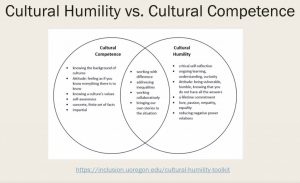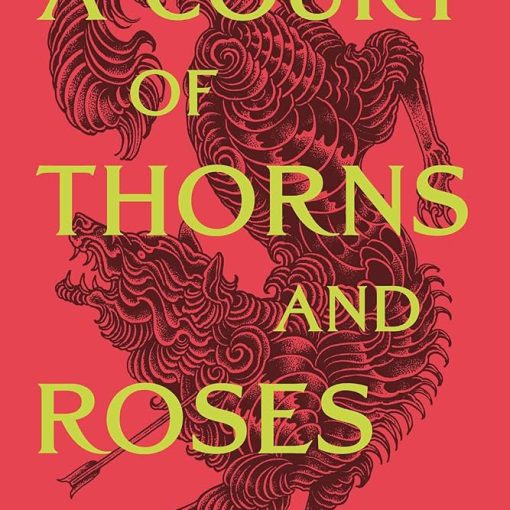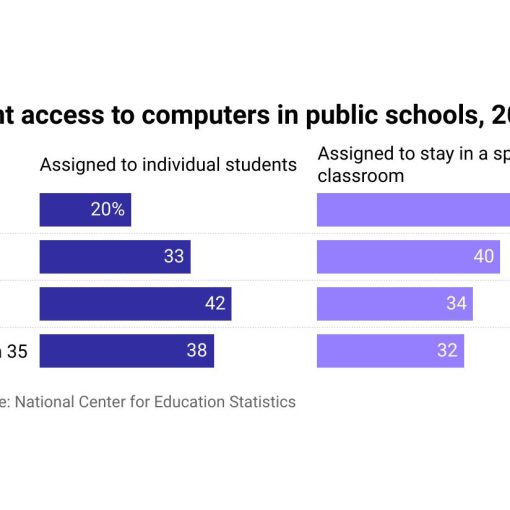Storytelling & Social Cohesion: How Libraries Can Make Voices Be Heard
Reflection Blogging: Week 10 – The Power of Stories

I don’t think it’s a stretch to say that the concept of a “Human Library” in its various forms and conceptions is, quite frankly, inextricable from the modernized twenty-first century library. I do especially appreciate the conversation from Emma Arne-Skidmore’s “New study on the impact of the Human Library” about how closely interwoven DEI principles are to the way this model is being incorporated into library spaces and programming – and how not just “reading” these Human Library Books but listening to them is where real traction occurs with tapping into the human potential for understanding and community-building. We see this in the Cultural Humility vs. Cultural Competence Venn diagram, in which “addressing inequalities” and an overlapping sense of collaboration to foster compassion and respect is central to being able to not only bringing new and diverse voices to the table in these types of events, but really, building the table itself.
By this I mean that the library space is primed to function as this “table” where these conversations ought to take place precisely because it is a place where information is mobile, and clearly innovative libraries have already recognized this in breaking the mold with their programming even just by conceptualizing services that can reach a wider or marginalized community. I especially appreciated this article I found in my research on the topic about how professors at the University of Illinois Urbana-Champaign have learned from their students, particularly their transgender or gender non-conforming students, in asking them to share their stories for an assignment. They conclude that providing a space to tell stories, and further sharing those stories so that they are heard, is a community-building affair that libraries are especially obligated to facilitate as representatives of and advocates for the communities they serve:
Public librarians have a responsibility to provide critical services to underserved populations, McDowell said. Communicating about social justice issues is “walking the talk of diversity and inclusion. Public libraries have the most benefit for people who have the least,” she said (Heckel, 2022).
I want to conclude this post by personally sharing how I’ve used storytelling to connect my own community together, though it has less to do with social justice, but still pertains to advocacy and identity. In 2021, my maternal grandfather was diagnosed with a glioblastoma (a tumor in the frontal lobe), and there has been a lot of traveling back and forth between our home in California and my mother’s hometown in rural Northern Alabama to take care of him in the three years that have passed. I am very grateful to say that, with treatment, he is now in full recovery from his cancer at 87 years old – which is very uncommon for this particular diagnosis. However, the worst of his illness took place during COVID where there were heavy restrictions that limited visitation during his various and many hospital stays, including his close friends and family. In an effort to connect him to his support network and in anticipation for his (at the time) 85th birthday, we asked those who know him to record their favorite stories about him and share them with us via social media so we could play them for him while he was stuck in bed.
When we played them for him, he had a lot of commentary (and amendments!) to add to the stories, which inspired us to sit down with him when he was feeling healthier and have him tell important stories about his life and our family. We’ve grouped these up in a Google Drive that we have shared with our family across the country, organized by time period and people, and asked them to contribute any stories by audio-recording them and uploading them online for us to archive. Without really knowing it, we actually created our own version of StoryCorps’ interviews! So, I wanted to share two of these stories my grandparents told together that we recorded for those who are interested in listening to a few family tales.
The first is about my great great aunt (Helen) and how she met her husband through a note she slipped into a strawberry crate. The second is about a road trip my great grandfather (Millard) and his brothers took to Texas for a funeral (and how they tried – and failed – to get out of a speeding ticket in Louisiana). The other voice you hear in these recordings is my own mom interviewing them.
Storytelling is an integral part of social bonding, in Southern culture especially; we have found that being able to participate in this community-building exercise by forming our own personal Human Library has been essential to maintaining these relationships from afar, given that my immediate family here in California is pretty far removed geographically from the rest of my mom’s side. We have been able to strengthen our sense of togetherness and be there for one another in an unconventional reimagining of a conventional and deeply-rooted social activity, which was beyond necessary during my grandfather’s health hardships in the last few years. My grandfather has told me that being given the opportunity to recount and, more importantly, record these tales from his life and of and about the people he loves (Millard was his father) was a profound experience that helped him retain some agency over a period of time where everything felt very out of control and, frankly, his prognosis did not look good.
It is a deeply human and healing activity to tell stories – and libraries, in any form, are deeply human and healing institutions.
References
Arne-Skidmore, E. (2021, August 4). New study on the impact of the Human Library. Human Library. https://humanlibrary.org/new-study-on-the-impact-of-the-human-library/
Heckel, J. (2022, November 3). Social justice storytelling helps librarians advocate for patrons, themselves. Phys.org. https://phys.org/news/2022-11-social-justice-storytelling-librarians-advocate.html




4 thoughts on “Storytelling & Social Cohesion: How Libraries Can Make Voices Be Heard | Reflection Blogging: Week 10 – The Power of Stories”
@gilbertmaryjoy OH! The recordings you shared are amazing. Thank you. On a personal note my family on both mom and dad side came from Eastern Kentucky and hearing the voices in your recordings reminded me so much of my family. That accent is just so special to me. My mom had 11 sisters and one brother and they all called their parents “mommy and daddy.” I loved that.
This song resonates deeply with me: https://www.youtube.com/watch?v=Qrcd1SMD924
Wow @michael– what a beautiful song. It gave me chills! I have so many songs I associate with being in the South and with my family. I think Jason Isbell’s Alabama Pines (https://www.youtube.com/watch?v=L9d5yNcFGlY) and really his entire catalog is probably the most emotional for me (I’m seeing him in July and I’m so excited), but also the Doobie Brothers’ Listen to the Music (https://www.youtube.com/watch?v=DkytJLoxGmQ) and CCR’s Cotton Fields (https://www.youtube.com/watch?v=ibWkp7OFB_A). We are an extremely musical family, and performed both of those songs at the W.C. Handy Music Festival in Florence (and recorded them at Skywalker Sound!). Daddy Ray sang lead Cotton Fields, it was very sweet 🙂
Okay, one more! This version of One Hundred Miles from the movie Inside Llweyn Davis: https://www.youtube.com/watch?v=GY_S0Xoo02A&list=RDMMZVfPu42wDvs&index=16. The violin is so mournful. I could talk music all day!